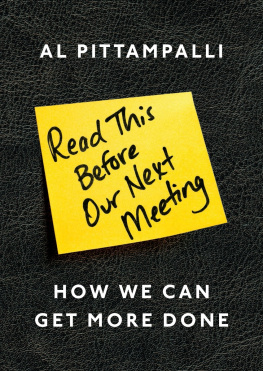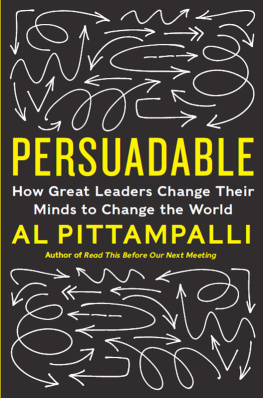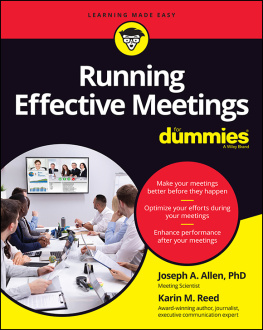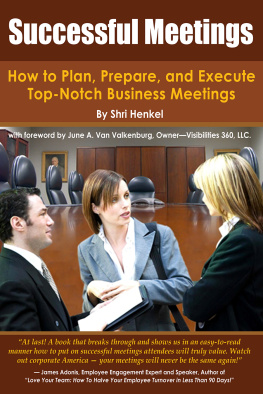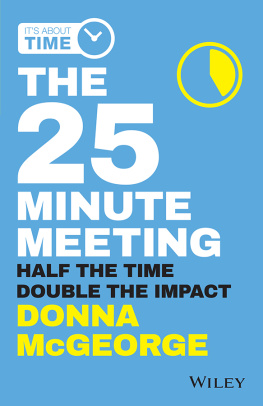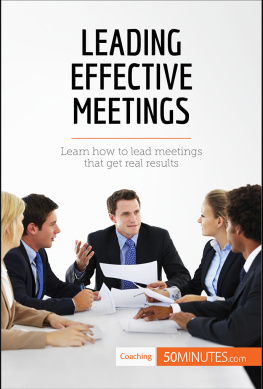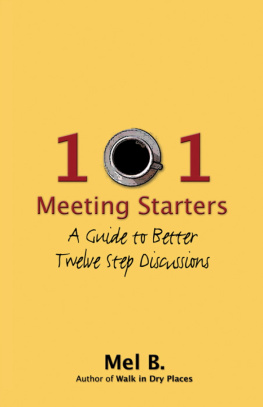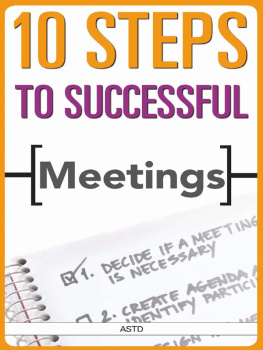One of the best things about having your ideas in the hands of so many is the feedback it produces. Countless executives, managers, and HR personnel have reached out to me to share inspiring success stories. And I do appreciate every one of them, but whats far more valuable to me is the sincere criticism from thoughtful readers on how some of the ideas in the book fell short for them. I take these criticisms very seriously, and as a result, Ive learned a great deal from them. Thats why Im so thrilled to finally get the opportunity to update the book based on those insights.
As readers of the original version will soon see, the most notable change Ive made is to convert the seven principles of the Modern Meeting Standard into eight principles. Because so many organizations suffer from meeting overload and decision paralysis, the Modern Meeting has always had an unapologetic bias toward action. But one of the concerns Ive heard from some teams is that speed seemed to be such a priority in the Standard that they never felt they had permission to slow down and fully debate a decision. Clearly, the original principles didnt have enough nuance.
As I make clear in this new edition, all decisions are not created equal. While over-discussion is an epidemic in organizations, some decisions warrant meetings that involve careful group analysis and debate. This new edition will show you which ones, and will teach you how to conduct these sessions without compromising the Modern Meetings spirit of decisiveness and forward progress. This spirit is embodied in the books new subtitle: How We Can Get More Done.
I cant promise you this will be the last time I update this book. In fact, in a world thats changing faster than ever, no business author should. Thats why Im officially announcing that this book is LIVE. If you have any suggestions, criticisms, or concerns on this book please send an email to: info@modernmeetingstandard.com. While I cant make real-time updates to this text, I can and will make them online. Thats why you should make sure to visit ModernMeetingStandard.com/updates to see the latest and greatest updates. Even better, enter your email address on the site and Ill provide you with regular articles and resources to help you turn the Modern Meeting from concept to reality in your organization.
WHAT DO YOU DO FOR A LIVING?
Someone asked me the other day what I do for a living. I found myself hard-pressed for an answer. If he wanted to know my job title, or what industry I worked in, then all I had to do was recite whats on my business card. But he seemed sincere. He honestly wanted to know what I do most of the day, so I was honest, too: What I do for a living is attend meetings. Bad meetings.
I dont know how weve found ourselves in this place.
One mediocre meeting after another quietly corrodes our organization, and every day we allow it to happen. Weve become so accustomed to long meetings, boring meetings, meetings lacking a clear purpose, that our curiosity about whether there might be a better alternative has faded into the background.
If we were to wake up for just a moment, wed realize that two things are undeniable:

We have too many meetings.
We have too many bad meetings.
For years, weve been told by meeting experts that we have too many meetings. The experts remind us that if a memo suffices, we shouldnt have the meeting. But to no avail. Without hesitation, day after day, each one of us schedules meetings like the one were about to attend today and, most certainly, tomorrow. Its a tragedy of the commonseveryone feels a benefit from calling a meeting, but few of us benefit from attending.
Over time, weve become nonchalant about bad meetings. If an operating room were as sloppily run as our meetings, patients would die. If a restaurant kitchen put as little planning into a meal as we put into our meetings, dinner would never be served.
But if that were the end of it, I wouldnt be writing this manifesto.
No, Im sharing this with you, on the eve of our meeting, because Ive noticed something even more shocking than the colossal amount of time were wasting at our organization. Worse than wasting time, the culture of useless meetings is changing us. Its becoming clear that our meeting culture is changing how we focus, what we focus on, and most important, what decisions we make.
Yes. Meetings matter.
In simple organizations, not so much.
In industrial organizations, not so often.
In organizations that dont have to wrestle with change, not at all.
In our organization, though, and in modern organizations everywhere, meetings are the lever that allows coherent motion. Meetings are the way we make change, and change is how we grow.
We work in a business of complex problems. Meetings were the invention created to provide the needed coordination. We need meetings to ensure that intelligent decisions are made and to confirm that our teams are interacting effectively on complex projects.
What we dont need, though, are standard meetingsthe mediocre meetings that actually and actively cripple our organization.
Our meetings have evolved into something else entirely. Weve fallen victim to mediocre meetings, not about coordination but about bureaucratic excuse making and the Kabuki dance of company politics. Were now addicted to meetings that insulate us from the work we ought to be doing.
But this new way of thinking is not about blame; its about opportunity. By changing a single tactic, by isolating and destroying the mediocre meeting, we can revamp the way projects are organized, decisions are made, and work gets done. We can reinvent the meeting and get back to the essential work of creation and coordination if we choose.
But we have to choose it. Its up to us and only us.
What could we do in a world with fewer meetings?
In a world with fewer meetings, wed have more time for our real work, the work we do that actually propels our organization forward. The work we do that makes a difference to our company, to the customers, or to our shareholders: the programming, designing, selling, writingthe art.

